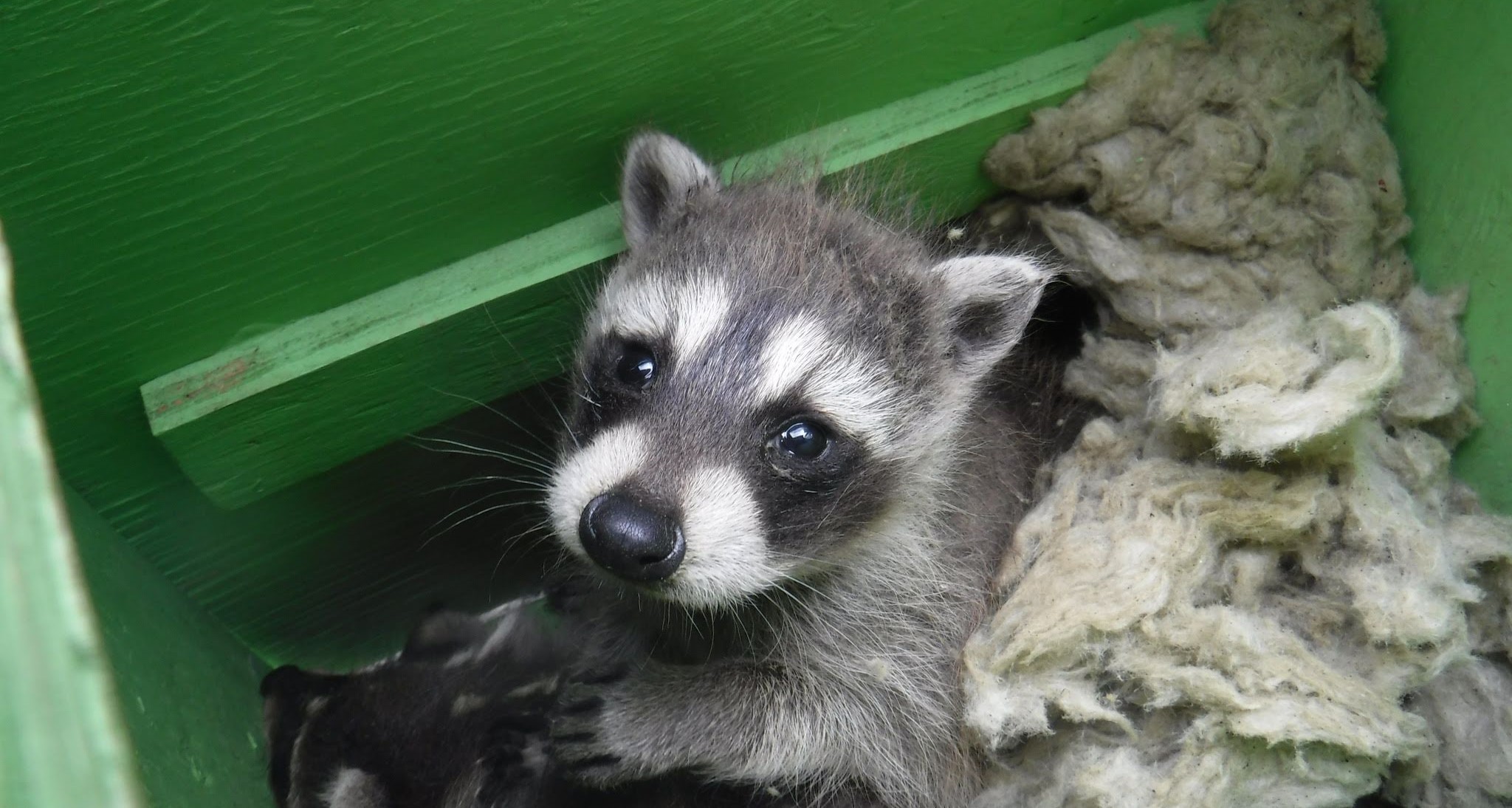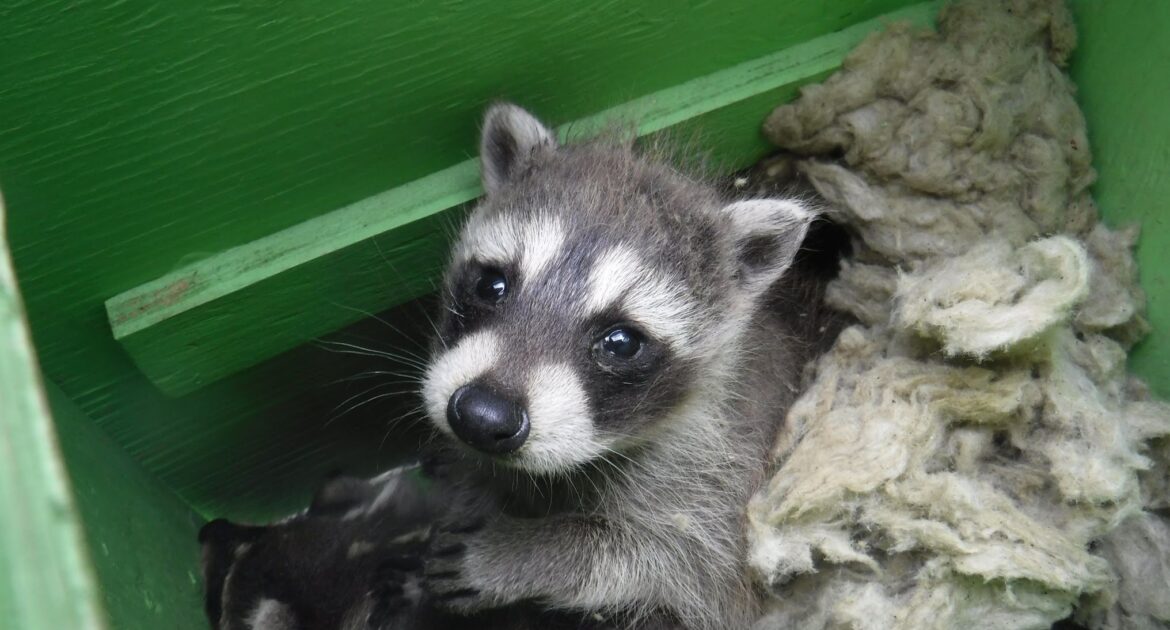Encountering a baby raccoon in your backyard can be both charming and concerning. As adorable as they are, many may wonder, are baby raccoons dangerous? While they are generally not aggressive, it’s crucial to remember that even young wildlife can carry diseases and become frightened when approached, leading to defensive behavior.
If you find a baby raccoon, do not attempt to handle it yourself. Instead, observe from a safe distance and contact professionals for assistance. With our expertise at Skedaddle Humane Wildlife Control, we ensure that the baby raccoon is safely and humanely removed while considering the welfare of both the animal and your family.
Raccoons are often drawn to areas with accessible food sources and shelter, so it’s essential to understand how to keep raccoons away to prevent future encounters. We will guide you through the key signs of baby raccoons, how to identify potential nesting spots in and around your property and the steps to take if you come across a baby raccoon.
Our wildlife removal in Marietta is dedicated to providing humane wildlife management, ensuring that you and your home remain safe while respecting the animals that share our environment.
Why Finding A Baby Raccoon Is Not Uncommon
These creatures, often mistaken for kittens due to their small size and cute appearance, have distinct characteristics. They possess bandit-like masks around their eyes, ringed tails, and dexterous front paws. Typically, they’re born in the spring and early summer, which is why you might encounter them during these seasons.
Contrary to popular belief, young raccoons aren’t inherently dangerous. However, their presence can indicate a larger issue—such as an adult raccoon nearby. While these animals can carry diseases like rabies, the likelihood of a baby being infected is low. Still, it’s essential to approach the situation with caution and awareness.
Raccoons typically breed in late winter to early spring, with a gestation period of about 63 days. This means that in the spring and early summer, it’s common to find young raccoons emerging from their dens as they begin to explore their surroundings.
These little ones are often drawn to properties looking for food sources, such as pet food left outside, uncovered trash, or bird feeders. As they venture out, their curious nature can lead them into residential areas, making encounters more likely.
You can look for several signs that indicate young raccoons may be present on your property. Look for overturned trash cans, scattered pet food, and distinct pawprints or trails. You might also notice noises such as crying or chirping sounds at night, which can signal the presence of a nearby nest. We understand that it can be concerning, especially when you have pets or small children.
What to Do When You Find a Baby Raccoon?
Discovering a baby raccoon can be a surprise, catching you off guard during your day. However, the safety and well-being of both the tiny creature and your family become the immediate focus. It’s crucial to handle the situation delicately, taking a moment to assess and respond with care. Here are a few steps you can take to navigate this unexpected encounter:
- Keep a Safe Distance: Observing the baby raccoon from afar is crucial. This keeps both you and the animal safe, as approaching could cause stress or provoke defensive behavior. Maintain at least a 50-foot distance to minimize any risk.
- Do Not Feed the Animal: Although it may be tempting to offer food, feeding the baby raccoon can lead to dependency on humans for nourishment and can encourage it to return to your property. Additionally, it can attract other wildlife, increasing the chances of future encounters.
- Monitor the Situation: Keep an eye on the raccoon from a safe location. Look for any signs of distress or health issues, such as lethargy or abnormal behavior, which could indicate that professional intervention is necessary.
- Contact Professionals: It’s best to reach out to a humane wildlife control service like ours. We understand the complexities of dealing with young wildlife and can provide the assistance needed to handle the situation safely and effectively.
When it comes to handling wildlife issues, particularly concerning raccoons, the risks associated with do-it-yourself removal are significant. Many people underestimate the dangers of approaching or trying to remove these creatures themselves. Not only can they be unpredictable and potentially aggressive if they feel threatened, but they can also carry diseases that pose risks to human health.
Additionally, improper handling can lead to injuries for both you and the animal. It’s essential to recognize that even the most adorable baby raccoon can exhibit defensive behavior when scared or cornered.
Moreover, there are legal implications tied to wildlife interactions. In many regions, strict regulations govern the handling and removal of raccoons and other wild animals. Attempting to conduct removal without a license can lead to fines or legal action. This isn’t just about protecting animals; it’s also about ensuring the safety and well-being of our communities.
Preventative Measures To Discourage Raccoons
To effectively prevent raccoons from nesting on your property, it is crucial to implement strategies that secure food sources and manage waste. By making small yet significant changes, you can keep these inquisitive creatures at bay. Here are essential tips for homeowners:
- Secure Garbage Cans: Always use raccoon-proof bins with tight-fitting lids. Look for containers that are difficult for raccoons to open. If possible, store bins in a garage or shed until collection day to limit access.
- Eliminate Food Sources: Do not leave pet food or birdseed outside overnight. Encourage pets to eat indoors and consider using feeders designed to keep out larger animals.
- Seal Entry Points: Inspect your home for gaps and holes in the foundation, soffits, and vents. Seal these openings with heavy-duty materials like metal or strong mesh to deter raccoons from entering garages, attics, or basements.
- Maintain Landscaping: Keep your garden tidy by pruning overgrown vegetation and removing fallen fruit from trees. This reduces potential foraging opportunities that might attract raccoons.
- Install Fencing: A tall fence can act as a barrier, especially if it is buried several inches underground to prevent digging. Ensure that the fence is at least four feet high and angled outward at the top for added security.
Why Choose Skedaddle in Marietta for Raccoon Removal
Hiring Skedaddle Humane Wildlife Control for your raccoon removal needs in Marietta offers numerous benefits. Our team of professional wildlife technicians is trained to handle these situations with expertise and care, ensuring that animals are removed humanely. We focus on educating our customers and providing them with the knowledge to prevent future incidents.
Experienced Technicians and Humane Methods
Skedaddle is dedicated to providing top-notch service. We prioritize humane removal methods, using techniques that ensure animals are removed safely and legally. By employing non-intrusive methods, we demonstrate our commitment to the well-being of both the animals and your home environment.
Customer Education and Follow-Up Services
Educating our customers is a priority at Skedaddle. We believe that informed homeowners are better equipped to prevent future wildlife incidents. As part of our follow-up services, we provide detailed reports and recommendations to ensure that your home remains wildlife-free. This comprehensive approach helps you understand the steps necessary to maintain a secure and safe living space.
Commitment to Customer Satisfaction
Customer satisfaction is at the core of our operations. We strive to deliver prompt, efficient, and professional services tailored to meet your specific needs. Our goal is to ensure that your home is safe and free from unwanted wildlife. Whether you are dealing with raccoons, squirrels, or other wildlife, our team is ready to assist you.
Take the First Step Towards a Wildlife-Free Home
Dealing with wildlife, particularly young raccoons, can present a range of challenges. From their curious nature to the potential risks they pose, it’s crucial to handle such situations with care and consideration. However, by adopting the right approach and seeking professional assistance, you can navigate these encounters effectively.
At Skedaddle Humane Wildlife Control in Marietta, we understand the complexities involved in wildlife management. Our team is dedicated to providing not only safe and humane resolutions but also peace of mind to our clients. Through a combination of extensive expertise, innovative methods, and a strong focus on customer satisfaction, we strive to ensure that every interaction results in a positive outcome.
Whether you’re facing a wildlife issue or simply seeking preventive measures, our comprehensive services are designed to meet your specific needs. Reach out to us today to discuss your situation, request a personalized quote, and take the first step towards creating a harmonious environment in your home, free from wildlife disruptions.




